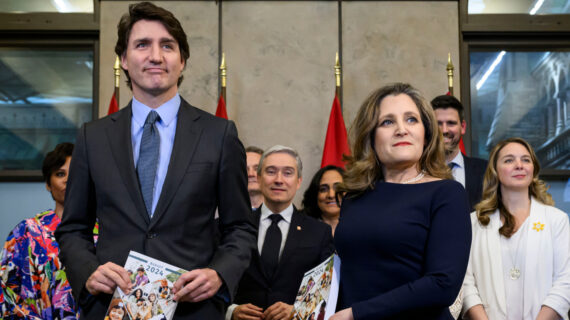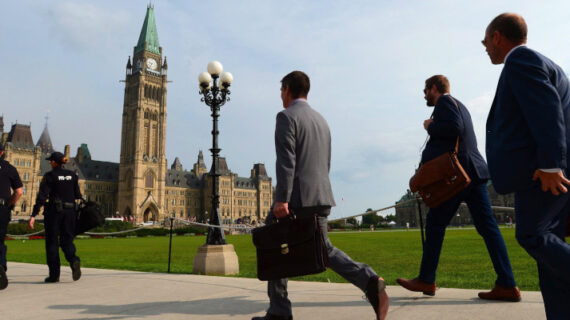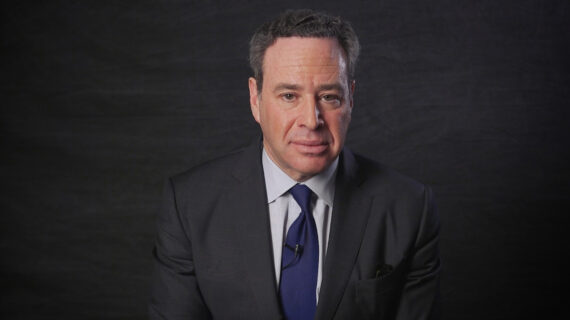Conservative members planning to vote in the party’s upcoming leadership election got their first chance to see the candidates in action on Thursday night.
The first debate of the campaign was an ill-tempered affair that saw the two front-runners battle it out while other candidates called for unity.
In this week’s roundup of the Conservative leadership race, we’re starting with Thursday night’s debate and we’re taking a look at how U.S. politics is once again creeping across the border.
Poilievre v. Charest, round one
The tone was set in Thursday night’s Conservative leadership debate when Ontario-area MP Pierre Poilievre strode onto the stage and, instead of a warm handshake from rival Jean Charest, he got the cold shoulder.
All the other candidates happily shook each other’s hands.
Charest might have sensed what was coming, because it took about 15 minutes before Poilievre launched his first assault on Charest, criticizing the former Quebec premier for his government’s fiscal record. Later in the debate, Poilievre raised questions about Charest’s recent employment by Chinese telecommunications Huawei.
“Mr. Charest needs to come clean with how much money he got from Huawei. We need to know the truth here. The Liberals are going to ask that. He’s never told us how much he got paid,” said Poilievre.
“This is a company whose software and hardware has been banned from the 5G networks of four of the Five Eye countries because of allegations, and many cases proven, that they have used it for espionage,” he said.
In his defence, Charest said that Huawei was welcomed into Canada by Stephen Harper’s government and that he was working from within the company to bring Canadian detainees Michael Spavor and Michael Kovrig home from China.
The debate took place at Ottawa’s Shaw Conference Centre to mark the beginning of the Canada Strong and Free Network’s conference that brings Canadian conservatives together to network and attend workshops and speeches. The conference runs until Saturday.
Ontario MLA Roman Baber and Ontario MPs Scott Aitchison and Leslyn Lewis were the other participants, while Brampton Mayor Patrick Brown chose not to attend.
Baber frequently pointed to his record criticizing COVID-19 lockdowns and mandates, which got him kicked out of the Ontario Progressive Conservative Party caucus, and said he would bring political courage to the federal party. Aitchison made several pleas for unity and complained that the tenor of the debate was hurting the party’s image, while Lewis touted her pro-life credentials.
The candidates agreed on a few things, such as their collective rejection of a consumer carbon tax and the shoddiness of the mainstream media, but the main event was the hour-long skirmish between Charest and Poilievre.
At one point Lewis knocked Poilievre off track by accusing him of not sufficiently supporting the “freedom convoy” that closed downtown Ottawa for several weeks and blocked two border crossings in the country. When Charest interjected to accuse the trucker protesters of criminal activity he was met with loud boos from the audience.
When the debate drew to a close, once again all the candidates shook hands while Charest and Poilievre conspicuously avoided each other. The next debate takes place on May 11 in Edmonton.
Roe v. Wade causes ripples in Canada
A draft decision overturning a landmark U.S. Supreme Court decision on abortion leaked to the press this week and has predictably caused some ripples in Canadian politics.
In the Conservative leadership race, some politicians pro-actively released statements while others ducked for cover on the controversial issue.
Brampton Mayor Patrick Brown issued a statement about the importance of “protecting women’s rights” and urged others to join him.
“Abortion in Canada should be safe, legal, and, in my personal opinion, rare. That’s why my government will support women and families with policies that encourage other options, such as adoption and increased parental supports,” Brown said. “This is why it’s important for us to be clear where we stand. A Conservative Party led by me will not change Canada’s abortion laws. Period.”
On Tuesday, Jean Charest tweeted that he is pro-choice and that a government with him at the helm “will not support legislation restricting reproductive rights.” Charest said that he would allow MPs to bring forward private member’s bills on “matters of conscience,” but that he would not vote to support them.
Roman Baber also pledged to allow MPs to bring forward legislation on the issue.
Although Leslyn Lewis refused to comment on the draft before it was officially unveiled by the court, she has released a number of anti-abortion policies, including a ban on sex-selective abortion.
Lewis, Scott Aitchison, and Pierre Poilievre are all sitting MPs and have been urged not to comment on the decision by interim leader Candice Bergen.




